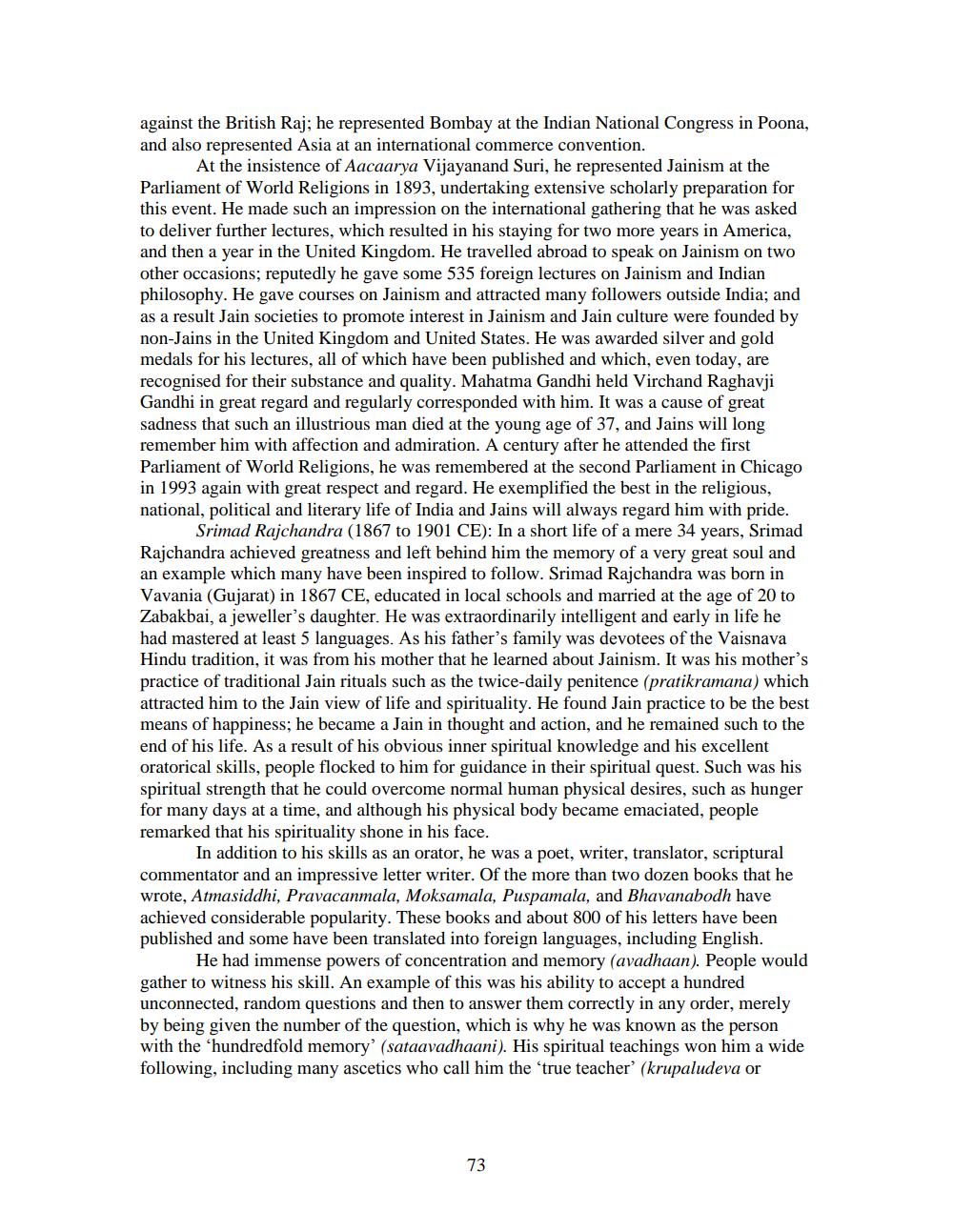________________
against the British Raj; he represented Bombay at the Indian National Congress in Poona, and also represented Asia at an international commerce convention.
At the insistence of Aacaarya Vijayanand Suri, he represented Jainism at the Parliament of World Religions in 1893, undertaking extensive scholarly preparation for this event. He made such an impression on the international gathering that he was asked to deliver further lectures, which resulted in his staying for two more years in America, and then a year in the United Kingdom. He travelled abroad to speak on Jainism on two other occasions; reputedly he gave some 535 foreign lectures on Jainism and Indian philosophy. He gave courses on Jainism and attracted many followers outside India, and as a result Jain societies to promote interest in Jainism and Jain culture were founded by non-Jains in the United Kingdom and United States. He was awarded silver and gold medals for his lectures, all of which have been published and which, even today, are recognised for their substance and quality. Mahatma Gandhi held Virchand Raghavji Gandhi in great regard and regularly corresponded with him. It was a cause of great sadness that such an illustrious man died at the young age of 37, and Jains will long remember him with affection and admiration. A century after he attended the first Parliament of World Religions, he was remembered at the second Parliament in Chicago in 1993 again with great respect and regard. He exemplified the best in the religious, national, political and literary life of India and Jains will always regard him with pride.
Srimad Rajchandra (1867 to 1901 CE): In a short life of a mere 34 years, Srimad Rajchandra achieved greatness and left behind him the memory of a very great soul and an example which many have been inspired to follow. Srimad Rajchandra was born in Vavania (Gujarat) in 1867 CE, educated in local schools and married at the age of 20 to Zabakbai, a jeweller's daughter. He was extraordinarily intelligent and early in life he had mastered at least 5 languages. As his father's family was devotees of the Vaisnava Hindu tradition, it was from his mother that he learned about Jainism. It was his mother's practice of traditional Jain rituals such as the twice-daily penitence (pratikramana) which attracted him to the Jain view of life and spirituality. He found Jain practice to be the best means of happiness; he became a Jain in thought and action, and he remained such to the end of his life. As a result of his obvious inner spiritual knowledge and his excellent oratorical skills, people flocked to him for guidance in their spiritual quest. Such was his spiritual strength that he could overcome normal human physical desires, such as hunger for many days at a time, and although his physical body became emaciated, people remarked that his spirituality shone in his face.
In addition to his skills as an orator, he was a poet, writer, translator, scriptural commentator and an impressive letter writer. Of the more than two dozen books that he wrote, Atmasiddhi, Pravacanmala, Moksamala, Puspamala, and Bhavanabodh have achieved considerable popularity. These books and about 800 of his letters have been published and some have been translated into foreign languages, including English.
He had immense powers of concentration and memory (avadhaan). People would gather to witness his skill. An example of this was his ability to accept a hundred unconnected, random questions and then to answer them correctly in any order, merely by being given the number of the question, which is why he was known as the person with the 'hundredfold memory' (sataavadhaani). His spiritual teachings won him a wide following, including many ascetics who call him the 'true teacher' (krupaludeva or
73




